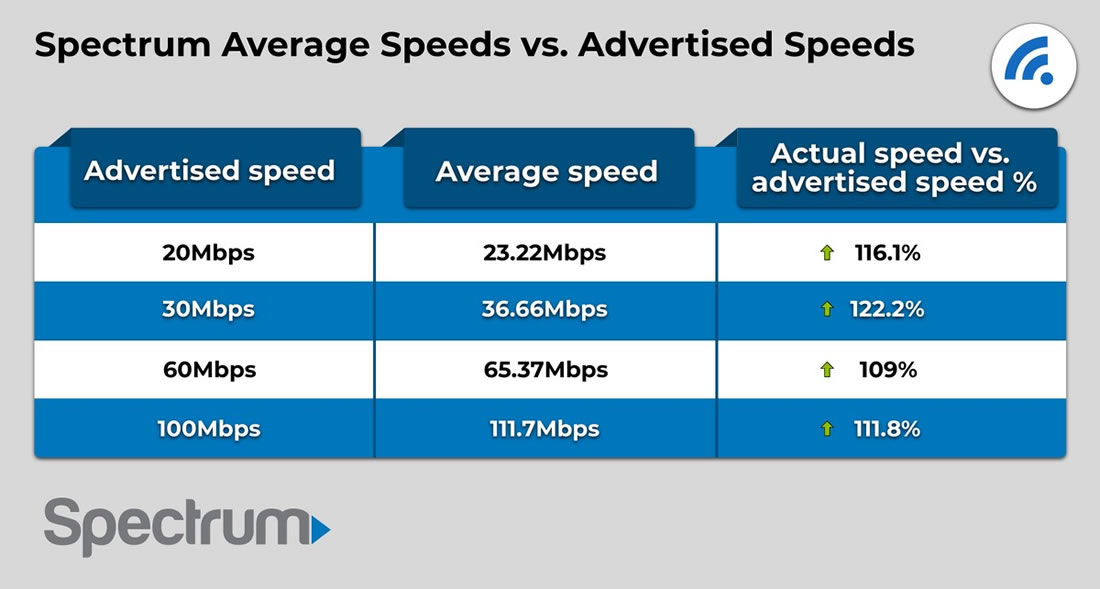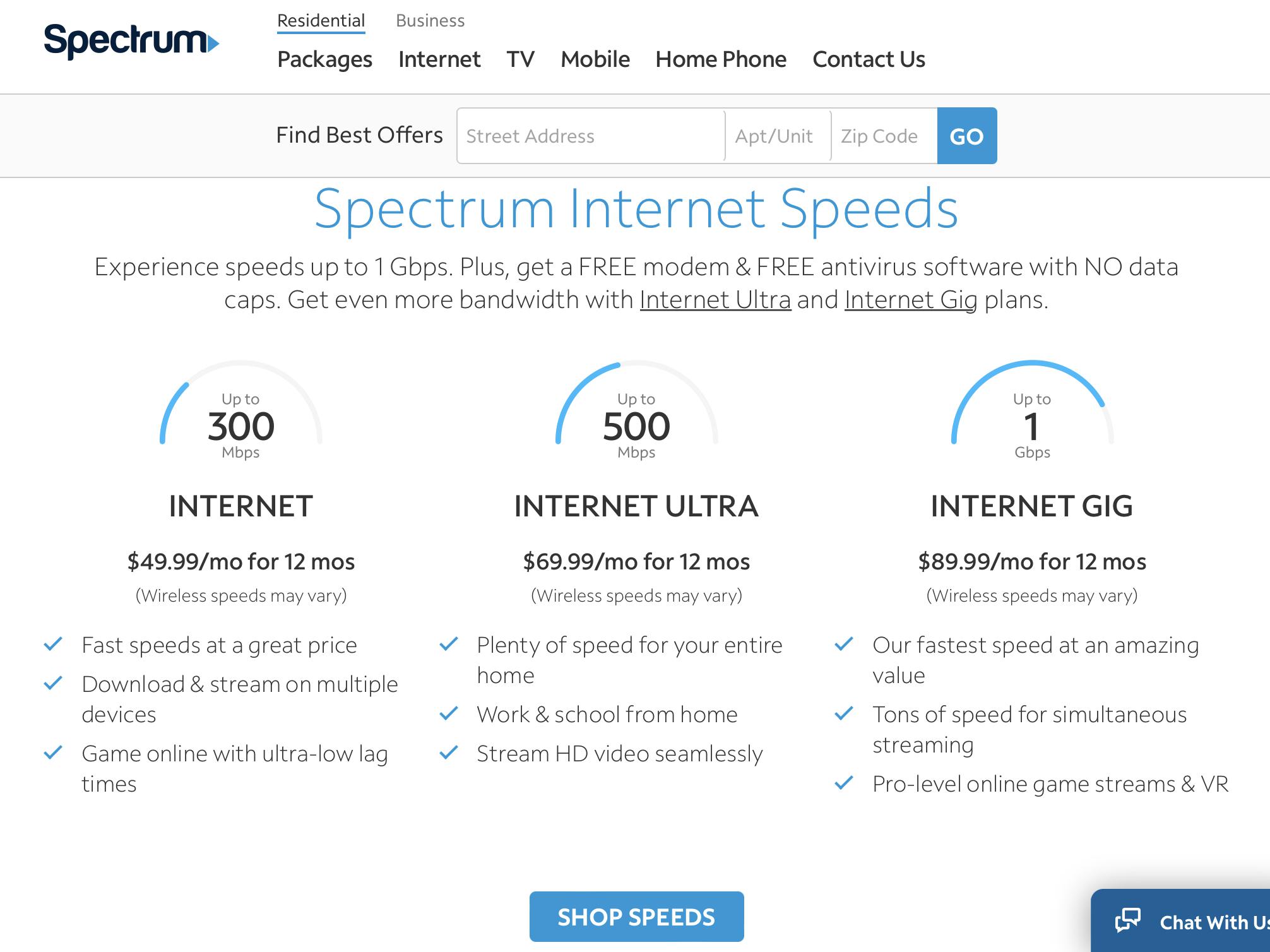Choose Spectrum internet speed based on your usage. 200 Mbps is suitable for most households; 400 Mbps is ideal for heavy users.
Spectrum offers a range of internet speeds to cater to various needs. A 200 Mbps plan works well for general browsing, streaming, and light gaming. For households with multiple users or heavy internet activities, a 400 Mbps plan provides a smoother experience.
Gamers and those who frequently download large files may benefit from even higher speeds. Understanding your specific requirements helps in making an informed decision. Assess your internet usage habits and the number of connected devices to determine the best Spectrum internet speed for your home. Making the right choice ensures a seamless and efficient online experience for everyone.
Choosing The Right Internet Speed
Choosing the right internet speed is crucial for a seamless online experience. Whether you are streaming, gaming, or working from home, the correct speed ensures efficiency. Let’s dive into how to determine the best Spectrum internet speed for your needs.
Assessing Your Needs
First, identify what activities you perform online. Do you stream movies or play online games? Perhaps you need to support multiple devices simultaneously. Understanding your online habits helps in selecting the right speed.
- Streaming – For HD streaming, you need at least 5 Mbps. For 4K streaming, 25 Mbps is essential.
- Gaming – Online gaming requires a minimum of 3 Mbps. Faster speeds reduce lag.
- Multiple Users – If multiple people use the internet, consider higher speeds. 50 Mbps or more may be necessary.
Factors To Consider
Several factors influence the internet speed you need. Assess these elements carefully:
- Number of Devices – More devices require higher speeds. Each device adds to the bandwidth requirement.
- Type of Activity – Different activities need different speeds. Browsing requires less speed compared to streaming or gaming.
- Future Needs – Plan for future usage. Your internet needs may grow over time.
Here’s a simple table to help you decide:
| Activity | Recommended Speed |
|---|---|
| Browsing & Email | 1-5 Mbps |
| HD Streaming | 5-10 Mbps |
| 4K Streaming | 25 Mbps |
| Online Gaming | 3-25 Mbps |
| Multiple Users | 50+ Mbps |
By considering these factors, you can choose the right Spectrum internet speed. Ensure a smooth and efficient online experience tailored to your needs.
Understanding Internet Speeds
Choosing the right internet speed is crucial for a smooth online experience. Whether you’re streaming, gaming, or working from home, understanding internet speeds helps in making an informed decision. This section breaks down essential concepts about internet speeds.
Download Vs. Upload
Download speed measures how fast data travels from the internet to your device. It’s vital for activities like streaming videos, browsing websites, and downloading files. Upload speed is the rate at which data travels from your device to the internet. This is important for video calls, uploading files, and online gaming.
Imagine you’re watching a movie online. The download speed affects how quickly the movie loads and plays without buffering. On the other hand, if you’re sending large email attachments or participating in a video call, the upload speed matters more. Knowing the difference helps in choosing the right plan for your needs.
Mbps Explained
Internet speeds are often measured in Mbps, which stands for Megabits per second. This unit indicates how much data can be transferred every second. Higher Mbps means faster internet speed. Here’s a simple table to understand different activities and their speed requirements:
| Activity | Recommended Speed (Mbps) |
|---|---|
| Browsing | 1-5 Mbps |
| Streaming HD Videos | 5-10 Mbps |
| Online Gaming | 10-25 Mbps |
| Streaming 4K Videos | 25+ Mbps |
For a family with multiple devices, choosing a higher Mbps plan ensures smooth internet use. For example, if you have four devices streaming HD videos, a plan with at least 20 Mbps would be ideal.
Common Internet Activities
Choosing the right Spectrum internet speed depends on your online activities. Different tasks require different bandwidths. Below, we explore common activities and the ideal speeds for each.
Streaming And Gaming
Streaming movies, TV shows, and videos require a fast and stable connection. High-definition (HD) streaming needs at least 5 Mbps. For 4K streaming, you will need 25 Mbps or more.
Online gaming also demands a strong connection. Most games work well with 3-6 Mbps. For a smoother experience, consider speeds of 15 Mbps or higher.
| Activity | Recommended Speed |
|---|---|
| HD Streaming | 5 Mbps |
| 4K Streaming | 25 Mbps |
| Online Gaming | 3-6 Mbps |
| Optimal Gaming | 15 Mbps |
Remote Work And Learning
Remote work and online learning have become essential. Video conferencing tools like Zoom or Microsoft Teams need reliable speeds. For standard video calls, 1-4 Mbps is enough.
For group meetings or HD video calls, aim for 10 Mbps or more. If multiple devices are used, higher speeds are beneficial.
- Standard Video Calls: 1-4 Mbps
- Group Meetings: 10 Mbps+
Downloading and uploading large files also require faster speeds. A speed of 20 Mbps ensures smooth uploads and downloads. For real-time collaboration, consider speeds of 50 Mbps.
| Task | Recommended Speed |
|---|---|
| Standard Video Calls | 1-4 Mbps |
| Group Meetings | 10 Mbps+ |
| Large File Downloads/Uploads | 20 Mbps |
| Real-Time Collaboration | 50 Mbps |
Household Size And Devices
Choosing the right Spectrum Internet speed depends on your household size and the number of devices. More people and gadgets mean more bandwidth is needed. Let’s explore the best options for different household sizes.
Single User
If you live alone, a lower-speed plan might be enough. Streaming, browsing, and social media use minimal bandwidth.
- Streaming in HD: 5-10 Mbps
- Online gaming: 10-25 Mbps
- Basic browsing and social media: 1-5 Mbps
For single users, a plan with 15-25 Mbps should suffice.
A family or shared living space requires more speed. Multiple devices need more bandwidth.
| Activity | Recommended Speed |
|---|---|
| HD Streaming | 15-25 Mbps per device |
| 4K Streaming | 25-50 Mbps per device |
| Online Gaming | 25-50 Mbps |
| Video Conferencing | 10-25 Mbps |
For a household of 3-4 members, a plan with 100 Mbps or more is ideal. This ensures smooth streaming, gaming, and browsing.
Types Of Internet Connections
Choosing the right internet connection is crucial for your online experience. Different types of connections offer various speeds and reliability. Understanding these types helps you pick the best one for your needs.
Dsl And Cable
DSL (Digital Subscriber Line) uses existing telephone lines for internet access. It offers moderate speeds suitable for browsing and streaming. DSL speeds range from 1 Mbps to 100 Mbps. This type is widely available in rural and urban areas.
Cable Internet uses coaxial cables, the same as cable TV. It provides faster speeds compared to DSL. Cable speeds range from 25 Mbps to 1 Gbps. It’s ideal for streaming, gaming, and multiple devices. Cable internet is more common in urban areas.
Fiber Optic
Fiber Optic Internet uses thin strands of glass or plastic fibers. It transmits data as light signals. This type offers the fastest speeds and highest reliability. Fiber speeds can reach up to 1 Gbps and even higher.
Fiber is perfect for heavy internet users and businesses. It supports seamless streaming, large file downloads, and video conferencing. Fiber optic availability is growing but is still limited in some regions.
| Type of Connection | Speed Range | Best For |
|---|---|---|
| DSL | 1 – 100 Mbps | Browsing, light streaming |
| Cable | 25 Mbps – 1 Gbps | Streaming, gaming, multiple devices |
| Fiber Optic | Up to 1 Gbps or higher | Heavy users, businesses |
- DSL: Moderate speeds, widely available
- Cable: Faster speeds, great for urban areas
- Fiber Optic: Ultra-fast, growing availability

Credit: www.reddit.com
Spectrum Internet Plans
Choosing the right Spectrum Internet plan can be tricky. Each plan offers different speeds and features. Knowing the options helps you decide what’s best for you.
Basic Plans
Spectrum’s Basic Plans are great for everyday use. These plans offer enough speed for browsing, streaming, and social media.
| Plan Name | Speed | Features |
|---|---|---|
| Internet 100 | Up to 100 Mbps | Good for 3-4 devices |
| Internet 200 | Up to 200 Mbps | Good for 5-7 devices |
Premium Plans
For heavy users, Spectrum offers Premium Plans. These plans provide higher speeds and better performance.
- Internet Ultra: Up to 400 Mbps. Ideal for 8-10 devices.
- Internet Gig: Up to 940 Mbps. Best for large families or home offices.
These plans support online gaming, 4K streaming, and large downloads. Choose based on your usage and household size.
Tips For Optimizing Speed
Getting the most out of your Spectrum internet speed involves more than just picking a plan. Optimizing your internet speed can make a big difference in your daily online activities. Here are some actionable tips to help you get the best performance from your connection.
Router Placement
Where you place your router significantly impacts your internet speed. Follow these tips for optimal placement:
- Central Location: Place your router in the center of your home.
- Elevate the Router: Keep it off the floor and higher up, like on a shelf.
- Avoid Obstacles: Keep it away from walls, metal objects, and appliances.
- Open Space: Place it in an open area for better signal distribution.
Network Security
Ensuring your network is secure can also improve your internet speed. Unsecured networks can be accessed by unauthorized users, which can slow down your connection. Here are some tips for securing your network:
- Strong Password: Use a complex and unique password for your Wi-Fi.
- Encryption: Enable WPA3 or WPA2 encryption on your router.
- Firmware Updates: Regularly update your router’s firmware for the latest security patches.
- Device Management: Monitor connected devices and remove unknown ones.
By following these tips, you can optimize your Spectrum internet speed and enjoy a smoother online experience.

Credit: www.reddit.com
Troubleshooting Speed Issues
Having the right internet speed can enhance your online experience. But, sometimes you may face speed issues. Identifying and fixing these problems can improve your connection. Let’s delve into the common issues and when to contact support.
Common Problems
Several factors can affect your internet speed. Identifying these can help in troubleshooting:
- Weak Wi-Fi Signal: Walls and other barriers can weaken the signal. Try moving closer to your router.
- Outdated Equipment: Old routers or modems may not support higher speeds. Consider upgrading your hardware.
- Too Many Devices: Multiple devices connected at once can slow down your speed. Disconnect devices not in use.
- Background Applications: Some apps use data even when not in use. Close unnecessary applications.
- Peak Usage Times: Internet speeds can drop during high-traffic periods. Try browsing during off-peak hours.
When To Contact Support
Sometimes, troubleshooting on your own may not resolve the issue. Here are signs it’s time to contact support:
- Consistent Slow Speeds: If your internet is always slow, there may be an issue with your service.
- Frequent Disconnections: Regular drops in connection can indicate a problem that needs professional help.
- Equipment Malfunctions: If your router or modem frequently needs resetting, it might be faulty.
- Service Outage: If you suspect an outage, contacting support can confirm and provide updates.
If you experience any of these issues, don’t hesitate to reach out to Spectrum’s support team for assistance.

Credit: www.broadbandsearch.net
Frequently Asked Questions
What Spectrum Internet Speed Do I Need?
The internet speed you need depends on your online activities. For browsing and emailing, 10-25 Mbps is sufficient. For streaming HD videos or gaming, consider 50-100 Mbps.
Is 100 Mbps Fast Enough For Streaming?
Yes, 100 Mbps is more than enough for streaming HD videos smoothly. This speed supports multiple devices and ensures buffer-free viewing.
How Do I Choose The Right Spectrum Internet Plan?
Consider your household size and online activities. For basic use, 25-50 Mbps is good. For heavy streaming or gaming, opt for 100-200 Mbps.
Does Higher Internet Speed Improve Gaming?
Yes, higher internet speeds reduce lag and improve gaming performance. For an optimal experience, aim for at least 50 Mbps. Lower speeds may cause delays.
Conclusion
Choosing the right Spectrum Internet speed is crucial for an optimal online experience. Assess your needs, consider the number of users, and match the speed to your activities. Whether for streaming, gaming, or remote work, Spectrum has a plan for you.
Make an informed decision and enjoy seamless connectivity.

